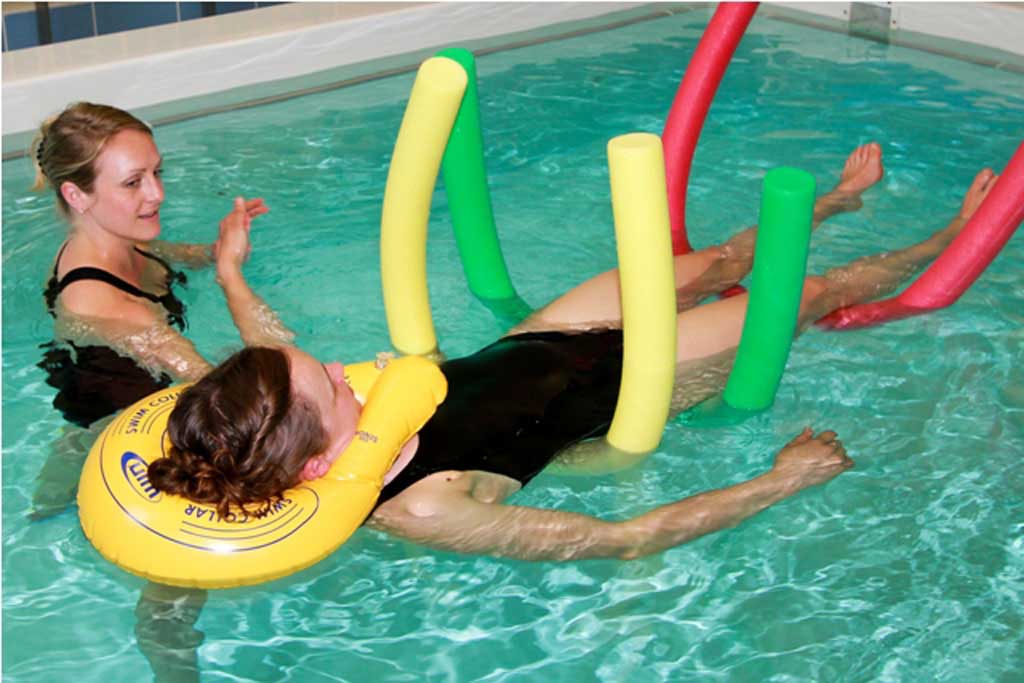What is hydrotherapy?
You may have heard of hydrotherapy but wondering just what it is? Hydrotherapy is a specialist form of physiotherapy which involves performing treatments and exercises, with a hydrotherapy trained therapist, in a designated hydrotherapy pool. That leads us into our next question…

What is a hydrotherapy pool?
What constitutes a pool being called a hydrotherapy pool? In short, in order to be called a hydrotherapy pool the water must be maintained within a specific temperature range. The water will usually be between 33°C and 36°C. This is much warmer than a traditional public swimming pool temperature, which would usually be between 26°C and 28°C.
What is hydrotherapy used for?
Hydrotherapy can be used to beneficially treat a variety of things:
- Arthritis, both Osteoarthritis and Rheumatoid Arthritis
- Post Op Joint replacements: Total hip replacements (THR) and total knee replacements (TKR)
- Fibromyalgia
- Chronic Pain
- Elderly
- Stroke
- Athletes
- Lower Back Pain
- Muscle Strains
How does hydrotherapy work?
Hydrotherapy works by manipulating the qualities of water to create support, assistance and resistance. While exercising in the hydrotherapy pool, the buoyancy of water allows for a hugely variable repertoire of exercises using:
- Support
Occurs with exercising at the surface of the water, this can be aided by buoyancy equipment such as noodles, paddles, boards, and armbands. - Assistance
Through manipulating the speed of movement and use of buoyancy aids the therapist can assist you to increase mobility, reduce pain improve coordination and balance. - Resistance
Again, through manipulating turbulence and buoyancy, when exercising the limb as it moves away from the surface of the water, the therapist can increase resistance. The advantage of hydrotherapy is it produces a beneficially uniform load spread over the entire length of the limb.
What are the benefits of hydrotherapy?
- Warm Water
The temperature of the water (kept between 33-36°C) allows for a comfortable, therapeutic environment for exercise whilst prompting muscle relaxation, facilitation of stretching and pain reduction. - Reduced Weight-bearing
Gravity is significantly reduced facilitating supported exercise that may not otherwise be allowed (e.g. at early stages post-operatively) or not be possible (e.g. in patients who are struggling with significant pain or weakness) and allows for progressive weight-bearing. With water up to your neck, the percentage of weight-bearing is only 8%, at chest-level it is only 30% and at hip-level it is only 50%. - Provides support, assistance or resistance while being challenged
This allows your therapist to optimise your programme to be appropriate and effective to any stage of your rehabilitation with the goals to regain flexibility, balance, posture, strength and CV (cardiovascular) fitness.
Benefits of Hydrotherapy for Arthritis: Both Osteo and Rheumatoid Arthritis
Most people with arthritis report that heat helps relieve their symptoms. The benefits of exercise is well documented in the evidence for both osteoarthritis and rheumatoid arthritis. The beauty of hydrotherapy is it combines the pain relieving element of heat with the powerful helpful qualities of exercise [1]. Even for people who struggle to do much exercise on land, the freedom water allows can be a real game changer for people suffering with osteoarthritis and rheumatoid arthritis.
Benefits of Hydrotherapy for Post Op Joint Replacement
One of the main benefits of hydrotherapy post knee replacement or hip replacement is the reduction in weight bearing load. The buoyancy of the water allows people to walk in the water where they may have been struggling to do so on land. If someone is struggling to improve their range due to pain, then hydrotherapy can be a great way to help improve their range of motion. The warmth of the water which reduces pain and relaxes muscles combined with the use of weights or floats can really help to increase the movement they have available at the replaced joint [1].
Benefits of Hydrotherapy for Fibromyalgia
The main benefit of hydrotherapy for fibromyalgia is the warmth of the water. As cold can often be a cause of worsening pain for those suffering with fibromyalgia, being able to exercise in a supportive, warm environment like the hydrotherapy pool means they can achieve much more from their exercise programmes when in a hydrotherapy pool than on land [1][7].
Benefits of Hydrotherapy for Chronic Pain
When it comes to chronic pain, the benefits of hydrotherapy are the pain killing properties of the warm water. Several studies have shown that exercise in a hydrotherapy pool for chronic pain sufferers had a positive effect on mood, sleep, pain levels and activity levels [2].
Benefits of Hydrotherapy for Elderly Individuals
There are numerous benefits of hydrotherapy for elderly individuals. Evidence has shown improvements in pain, joint mobility, strength, function, self-efficacy, fitness and balance [1]. This is a pretty impressive list that most of the elderly population would be happy to see improvements in. Hydrotherapy is a nice, safe way to get otherwise immobile moving and improving. We certainly find in clinics that our older clients get great results from their hydrotherapy sessions and see real measurable improvements in their quality of life.
Benefits of Hydrotherapy for Stroke Patients
There is great evidence to highlight the benefits of hydrotherapy for stroke patients. Hydrotherapy has been shown to be effective in improving postural balance and leg strength [3], walking balance and walking function [4]. This, combined with all the other benefits of hydrotherapy, means that it is an extremely valuable tool in the rehab and recovery of sufferers post stroke.
Benefits of Hydrotherapy for Athletes
This is an interesting one. Most athletes would be familiar with the use of the dreaded cold water immersion or contrast water immersion but few would have regularly used hot water immersion. While there is still some debate as to the efficacy of cold and contrast water immersion on healing times and recovery, the use of heat has been shown to facilitate cardiovascular recovery post exercise [5] and effective in the recovery of muscle strength [6]. Check out the below video for a demonstration of running exercises in hydrotherapy.
Benefits of Hydrotherapy for Lower Back Pain
The main two benefits of hydrotherapy for lower back pain are the buoyancy support of the water and the pain relieving heat. The buoyancy of the water can reduce the load on a sore and sensitive back. This combined with the pain relieving heat of the water and accompanying reduction in muscle tone has been shown to help improve range of movement, pain levels and function in sufferers of low back pain [2].
What are the side effects of hydrotherapy?
You may be wondering if there are any side effects of hydrotherapy. As with most interventions, different people respond differently. After being in warm water you can feel quite tired and drained. Hydrotherapy can also make you feel hungry and dehydrated due to water loss from the heat of the water. As a consequence, some people can suffer from headaches. You can combat this by eating a snack (such as a banana) and drinking plenty of water before and after the session. Drinking water can also be supplied during the session if needed.
We have had some clients experience feeling cold after leaving the warm water. The area around the pool is heated and the changing areas are too, with the aim of limiting this. Some people have reported feeling achy after a session but, again, this is quite normal, especially if you have not exercised for a while. The repetition of the hydrotherapy exercises session after session will mean that your body quickly adapts to these new stresses and the initial achiness will improve.
What are the risks for hydrotherapy?
While hydrotherapy is a great option for most people, there are some conditions or presentations that will either need to proceed with caution or will not be suitable for hydrotherapy. The specialist physio who undertakes your initial assessment (which will be done on land) will take you through a screening process to check that you are definately suitable. For those who are fearful of water and/or cannot swim, the pool is never deeper than chest height.
Some things that the physio will need to be aware of and may stop you participating in hydrotherapy are:
- Infections – particularly skin infections
- Cardiovascular disease
- Epilepsy – as long as it is controlled it shouldn’t be a problem
- Recent surgery – depending on what this is
- Skin conditions
- Illness, including common colds and fevers
- Aquaphobia
- Labarynthitis
- Low blood pressure
- A history of fainting
If you are suffering with any of the following then you will unfortunately not be able to undertake hydrotherapy at this time:
- Severe uncontrolled epilepsy
- Incontinence
- Open wounds
- Tracheotomy
- Contagious diseases
- Urinary tract infection
- Recent chemotherapy
Is hydrotherapy right for me?
Hopefully you have a good idea from all of the above information as to whether hydrotherapy is a suitable treatment option for you. Hydrotherapy is a great, safe and fun way to undertake some exercise under the guidance of one our specialist physiotherapists. It’s a great way to get back into exercise gently after a long lay off.
How many times a week should you do hydrotherapy?
You may be asking how many times a week should you do hydrotherapy? There is some evidence to show that 3 times a week for an hour at a time undertaking movements and exercise which resulted in a 60-80% max heart rate being achieved. Resulted in significant health benefits for a population of fibromyalgia patients [7].
Booking a Hydrotherapy Appointment With Central Health Physio
At our Chelsea clinic, based within the beautiful grounds of The Royal Hospital, we offer a range of exercise opportunities in our hydrotherapy pool including:
- 1:1 private hydrotherapy
- 1:4 strengthening/conditioning class
- supervised self-hydrotherapy sessions (pre-booked self-directed sessions where you follow a structured individualised printed and laminated exercise programme given to you during a previous 1:1 session)
To book an appointment call us on 020 740 46343 and select option 1 for Chelsea. One of the team will be happy to help you.
References & Further Reading
- Geytenbeek (2002), Evidence for effective hydrotherapy’ Physiotherapy – A systematic review, Vol. 88:9, Pg. 514-529.
- Sawant and Shinde (2019), Effect of Hydrotherapy Based Exercises for Chronic Nonspecific Low Back Pain. IJPOT. Vol.13:1, Pg. 149-154.
- Chae et al (2020), Effectiveness of hydrotherapy on balance and paretic knee strength in patients with stroke. A systematic review. AJPMR Vol. 99:5, Pg. 409-419.
- Zhu et al (2015), Hydrotherapy vs conventional land-based exercise for improving walking and balance after stroke. Clinical Rehab. Pg. 1-7
- Cuesta-Vargas et al (2013), Hydrotherapy as a recovery strategy after exercise: a pragmatic controlled tria. BMC Vol: 18:13 Pg. 180
- Zurawlew et al (2016), Post-exercise hot water immersion induces heat acclimation and improves endurance exercise performance in the heat. Scand J Med Sci Sports Vol:26:7 Pg. 745-754.
- Perraton et al (2009), Components of effective randomised controlled trials of hydrotherapy programmes for fibromyalgia syndrome: A systematic review. Vol. 2, Pg. 165-173.




Comments